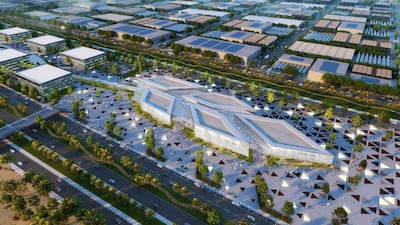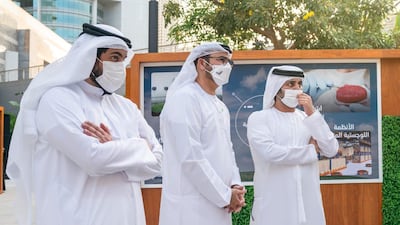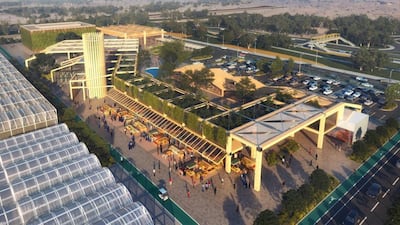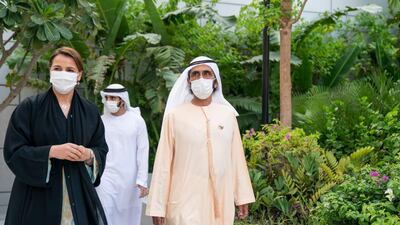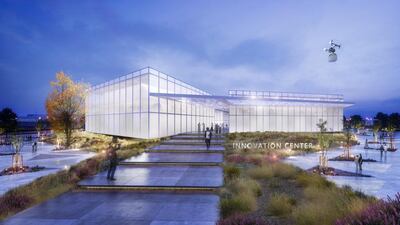Dubai has launched a major new food technology hub set to act as a "global destination" for enterprising businesses and a key driver of the emirate's economy.
Sheikh Mohammed bin Rashid, Vice President and Ruler of Dubai, unveiled the forward-thinking Food Tech Valley on Saturday.
He said the "city" would help further develop vertical farming and other advanced agriculture technologies and bolster the UAE's food security.
The state-of-the-art centre aims to triple the UAE's food production and make the country more self-sustainable.
It was developed through a partnership between the Ministry of Food and Water Security and Wasl Properties.
"We launched the first phase of Food Tech Valley, a new modern and vibrant city that will serve as a global destination for start-ups and industry experts in the food ecosystem," Sheikh Mohammed said.
"It will host R&D [research and development] facilities, an innovation centre, a smart food logistics hub and areas for vertical farming.
"The UAE's food trade exceeds Dh100 billion ($27.2) annually. Our country is a global food logistics hub, and we will work to create a nurturing environment for agribusinesses to develop new farming technologies and enhance our future food security.
“Food Tech Valley is part of a series of projects that aim to sustain the UAE’s food, water and agricultural systems in line with the National Food Security Strategy.
"Food and medicine represent strategic sectors that help us ensure a prosperous and sustainable future for the next generation.”
Sheikh Mohammed was joined at the launch by Sheikh Hamdan bin Mohammed, Crown Prince of Dubai, and Minister of State for Food Security, Mariam Al Mheiri.
A huge stride forward for food security goals
Ms Al Mheri said the Food Tech Valley was critical to the goal of achieving self-sufficiency and conserving essential resources.
"The Food Tech Valley project represents an instrumental stride towards enhancing food security and will serve as a global destination for expertise in the entire food ecosystem," she said.
"It will also be an economic zone, which is particularly significant considering that the size of the AgTech market is projected to grow from $13.5 billion to $22 billion over the next four years.
"The project features a food innovation centre that has been designed to resemble a head of wheat and will incorporate laboratories, research centres and prototype agricultural systems.
"Strategically located close to universities and academic institutions, it will support the R&D ecosystem and explore and deliver sustainable solutions around food.
"We seek to adopt and develop the latest methods for smart agriculture and food production, rationalise water use, accelerate basic food self-sufficiency, and share our successful experiences with countries around the world. This will help us achieve the Sustainable Development Goals and safeguard the future of forthcoming generations."
The food hub will be made up of four main clusters; agricultural technology and engineering, a food innovation centre, R&D facilities, and an advanced smart food logistics hub.
UAE leading food security drive:
The UAE has been at the forefront of international efforts to enhance food security through embracing new technologies and partnering with leading firms in the growing agri-tech sector.
Last year, Abu Dhabi Investment Office provided $100 million (Dh367m) to partner agricultural technology companies AeroFarms, Madar Farms, RNZ and RDI to build agritech research and development facilities, and production centres in Abu Dhabi.
Their aim is to explore how countries with an arid climate can benefit from these technologies.
"Agritech will help to increase our domestic food production while minimising the use of water, one of the scarcest resources in our region," said Minister of State for Food Security Mariam Al Mheiri.
The minister has stated that vertical farms were key to preserving water resources.
"Generally, vertical farming uses 90 per cent less water than traditional farming," Ms Al Mheiri said.
"Reducing water consumption through vertical farms can also have a very positive economic and environmental impact.
Squad
Ali Kasheif, Salim Rashid, Khalifa Al Hammadi, Khalfan Mubarak, Ali Mabkhout, Omar Abdulrahman, Mohammed Al Attas, Abdullah Ramadan, Zayed Al Ameri (Al Jazira), Mohammed Al Shamsi, Hamdan Al Kamali, Mohammed Barghash, Khalil Al Hammadi (Al Wahda), Khalid Essa, Mohammed Shaker, Ahmed Barman, Bandar Al Ahbabi (Al Ain), Al Hassan Saleh, Majid Suroor (Sharjah) Walid Abbas, Ahmed Khalil (Shabab Al Ahli), Tariq Ahmed, Jasim Yaqoub (Al Nasr), Ali Saleh, Ali Salmeen (Al Wasl), Hassan Al Muharami (Baniyas)
Living in...
This article is part of a guide on where to live in the UAE. Our reporters will profile some of the country’s most desirable districts, provide an estimate of rental prices and introduce you to some of the residents who call each area home.
Milestones on the road to union
1970
October 26: Bahrain withdraws from a proposal to create a federation of nine with the seven Trucial States and Qatar.
December: Ahmed Al Suwaidi visits New York to discuss potential UN membership.
1971
March 1: Alex Douglas Hume, Conservative foreign secretary confirms that Britain will leave the Gulf and “strongly supports” the creation of a Union of Arab Emirates.
July 12: Historic meeting at which Sheikh Zayed and Sheikh Rashid make a binding agreement to create what will become the UAE.
July 18: It is announced that the UAE will be formed from six emirates, with a proposed constitution signed. RAK is not yet part of the agreement.
August 6: The fifth anniversary of Sheikh Zayed becoming Ruler of Abu Dhabi, with official celebrations deferred until later in the year.
August 15: Bahrain becomes independent.
September 3: Qatar becomes independent.
November 23-25: Meeting with Sheikh Zayed and Sheikh Rashid and senior British officials to fix December 2 as date of creation of the UAE.
November 29: At 5.30pm Iranian forces seize the Greater and Lesser Tunbs by force.
November 30: Despite a power sharing agreement, Tehran takes full control of Abu Musa.
November 31: UK officials visit all six participating Emirates to formally end the Trucial States treaties
December 2: 11am, Dubai. New Supreme Council formally elects Sheikh Zayed as President. Treaty of Friendship signed with the UK. 11.30am. Flag raising ceremony at Union House and Al Manhal Palace in Abu Dhabi witnessed by Sheikh Khalifa, then Crown Prince of Abu Dhabi.
December 6: Arab League formally admits the UAE. The first British Ambassador presents his credentials to Sheikh Zayed.
December 9: UAE joins the United Nations.
Ten tax points to be aware of in 2026
1. Domestic VAT refund amendments: request your refund within five years
If a business does not apply for the refund on time, they lose their credit.
2. E-invoicing in the UAE
Businesses should continue preparing for the implementation of e-invoicing in the UAE, with 2026 a preparation and transition period ahead of phased mandatory adoption.
3. More tax audits
Tax authorities are increasingly using data already available across multiple filings to identify audit risks.
4. More beneficial VAT and excise tax penalty regime
Tax disputes are expected to become more frequent and more structured, with clearer administrative objection and appeal processes. The UAE has adopted a new penalty regime for VAT and excise disputes, which now mirrors the penalty regime for corporate tax.
5. Greater emphasis on statutory audit
There is a greater need for the accuracy of financial statements. The International Financial Reporting Standards standards need to be strictly adhered to and, as a result, the quality of the audits will need to increase.
6. Further transfer pricing enforcement
Transfer pricing enforcement, which refers to the practice of establishing prices for internal transactions between related entities, is expected to broaden in scope. The UAE will shortly open the possibility to negotiate advance pricing agreements, or essentially rulings for transfer pricing purposes.
7. Limited time periods for audits
Recent amendments also introduce a default five-year limitation period for tax audits and assessments, subject to specific statutory exceptions. While the standard audit and assessment period is five years, this may be extended to up to 15 years in cases involving fraud or tax evasion.
8. Pillar 2 implementation
Many multinational groups will begin to feel the practical effect of the Domestic Minimum Top-Up Tax (DMTT), the UAE's implementation of the OECD’s global minimum tax under Pillar 2. While the rules apply for financial years starting on or after January 1, 2025, it is 2026 that marks the transition to an operational phase.
9. Reduced compliance obligations for imported goods and services
Businesses that apply the reverse-charge mechanism for VAT purposes in the UAE may benefit from reduced compliance obligations.
10. Substance and CbC reporting focus
Tax authorities are expected to continue strengthening the enforcement of economic substance and Country-by-Country (CbC) reporting frameworks. In the UAE, these regimes are increasingly being used as risk-assessment tools, providing tax authorities with a comprehensive view of multinational groups’ global footprints and enabling them to assess whether profits are aligned with real economic activity.
Contributed by Thomas Vanhee and Hend Rashwan, Aurifer
MATCH INFO
Uefa Champions League semi-finals, first leg
Liverpool v Roma
When: April 24, 10.45pm kick-off (UAE)
Where: Anfield, Liverpool
Live: BeIN Sports HD
Second leg: May 2, Stadio Olimpico, Rome
How does ToTok work?
The calling app is available to download on Google Play and Apple App Store
To successfully install ToTok, users are asked to enter their phone number and then create a nickname.
The app then gives users the option add their existing phone contacts, allowing them to immediately contact people also using the application by video or voice call or via message.
Users can also invite other contacts to download ToTok to allow them to make contact through the app.
Most%20ODI%20hundreds
%3Cp%3E49%20-%20Sachin%20Tendulkar%2C%20India%0D%3Cbr%3E47%20-%20Virat%20Kohli%2C%20India%0D%3Cbr%3E31%20-%20Rohit%20Sharma%2C%20India%0D%3Cbr%3E30%20-%20Ricky%20Ponting%2C%20Australia%2FICC%0D%3Cbr%3E28%20-%20Sanath%20Jayasuriya%2C%20Sri%20Lanka%2FAsia%0D%3Cbr%3E27%20-%20Hashim%20Amla%2C%20South%20Africa%0D%3Cbr%3E25%20-%20AB%20de%20Villiers%2C%20South%20Africa%2FAfrica%0D%3Cbr%3E25%20-%20Chris%20Gayle%2C%20West%20Indies%2FICC%0D%3Cbr%3E25%20-%20Kumar%20Sangakkara%2C%20Sri%20Lanka%2FICC%2FAsia%0D%3Cbr%3E22%20-%20Sourav%20Ganguly%2C%20India%2FAsia%0D%3Cbr%3E22%20-%20Tillakaratne%20Dilshan%2C%20Sri%20Lanka%0D%3C%2Fp%3E%0A
The specs
Price, base / as tested Dh135,000
Engine 1.6L turbo
Gearbox Six speed automatic with manual and sports mode
Power 165hp @ 6,000rpm
Torque 240Nm @ 1,400rpm 0-100kph: 9.2 seconds
Top speed 420 kph (governed)
Fuel economy, combined 35.2L / 100km (est)
AWARDS
%3Cp%3E%3Cstrong%3EBest%20Male%20black%20belt%3A%20%3C%2Fstrong%3ELucas%20Protasio%20(BRA)%3Cbr%3E%3Cstrong%3EBest%20female%20black%20belt%3A%20%3C%2Fstrong%3EJulia%20Alves%20(BRA)%3Cbr%3E%3Cstrong%3EBest%20Masters%20black%20belt%3A%3C%2Fstrong%3E%20Igor%20Silva%20(BRA)%3Cbr%3E%3Cstrong%3EBest%20Asian%20Jiu-Jitsu%20Federation%3A%3C%2Fstrong%3E%20Kazakhstan%3Cbr%3E%3Cstrong%3EBest%20Academy%20in%20UAE%3A%20%3C%2Fstrong%3ECommando%20Group%2C%20Abu%20Dhabi%3Cbr%3E%3Cstrong%3EBest%20International%20Academy%3A%3C%2Fstrong%3E%20Commando%20Group%2C%20Abu%20Dhabi%3Cbr%3E%3Cstrong%3EAfrican%20Player%20of%20the%20Year%3A%20%3C%2Fstrong%3EKatiuscia%20Yasmira%20Dias%20(GNB)%3Cbr%3E%3Cstrong%3EOceanian%20Player%20of%20the%20Year%3A%20%3C%2Fstrong%3EAnton%20Minenko%20(AUS)%3Cbr%3E%3Cstrong%3EEuropean%20Player%20of%20the%20Year%3A%3C%2Fstrong%3E%20Rose%20El%20Sharouni%20(NED)%3Cbr%3E%3Cstrong%3ENorth%20and%20Central%20American%20Player%20of%20the%20Year%3A%20%3C%2Fstrong%3EAlexa%20Yanes%20(USA)%3Cbr%3E%3Cstrong%3EAsian%20Player%20of%20the%20Year%3A%20%3C%2Fstrong%3EZayed%20Al%20Katheeri%20(UAE)%3Cbr%3E%3Cstrong%3ERookie%20of%20the%20Year%3A%3C%2Fstrong%3E%20Rui%20Neto%20(BRA)Rui%20Neto%20(BRA)%3C%2Fp%3E%0A
Five hymns the crowds can join in
Papal Mass will begin at 10.30am at the Zayed Sports City Stadium on Tuesday
Some 17 hymns will be sung by a 120-strong UAE choir
Five hymns will be rehearsed with crowds on Tuesday morning before the Pope arrives at stadium
‘Christ be our Light’ as the entrance song
‘All that I am’ for the offertory or during the symbolic offering of gifts at the altar
‘Make me a Channel of your Peace’ and ‘Soul of my Saviour’ for the communion
‘Tell out my Soul’ as the final hymn after the blessings from the Pope
The choir will also sing the hymn ‘Legions of Heaven’ in Arabic as ‘Assakiroo Sama’
There are 15 Arabic speakers from Syria, Lebanon and Jordan in the choir that comprises residents from the Philippines, India, France, Italy, America, Netherlands, Armenia and Indonesia
The choir will be accompanied by a brass ensemble and an organ
They will practice for the first time at the stadium on the eve of the public mass on Monday evening
IF YOU GO
The flights: FlyDubai offers direct flights to Catania Airport from Dubai International Terminal 2 daily with return fares starting from Dh1,895.
The details: Access to the 2,900-metre elevation point at Mount Etna by cable car and 4x4 transport vehicle cost around €57.50 (Dh248) per adult. Entry into Teatro Greco costs €10 (Dh43). For more go to www.visitsicily.info
Where to stay: Hilton Giardini Naxos offers beachfront access and accessible to Taormina and Mount Etna. Rooms start from around €130 (Dh561) per night, including taxes.
PREMIER LEAGUE FIXTURES
All times UAE ( 4 GMT)
Saturday
West Ham United v Tottenham Hotspur (3.30pm)
Burnley v Huddersfield Town (7pm)
Everton v Bournemouth (7pm)
Manchester City v Crystal Palace (7pm)
Southampton v Manchester United (7pm)
Stoke City v Chelsea (7pm)
Swansea City v Watford (7pm)
Leicester City v Liverpool (8.30pm)
Sunday
Brighton and Hove Albion v Newcastle United (7pm)
Monday
Arsenal v West Bromwich Albion (11pm)
How to avoid crypto fraud
- Use unique usernames and passwords while enabling multi-factor authentication.
- Use an offline private key, a physical device that requires manual activation, whenever you access your wallet.
- Avoid suspicious social media ads promoting fraudulent schemes.
- Only invest in crypto projects that you fully understand.
- Critically assess whether a project’s promises or returns seem too good to be true.
- Only use reputable platforms that have a track record of strong regulatory compliance.
- Store funds in hardware wallets as opposed to online exchanges.
COMPANY PROFILE
Name: Lamsa
Founder: Badr Ward
Launched: 2014
Employees: 60
Based: Abu Dhabi
Sector: EdTech
Funding to date: $15 million
Four-day collections of TOH
Day Indian Rs (Dh)
Thursday 500.75 million (25.23m)
Friday 280.25m (14.12m)
Saturday 220.75m (11.21m)
Sunday 170.25m (8.58m)
Total 1.19bn (59.15m)
(Figures in millions, approximate)
The specs
Engine: 2.0-litre 4-cyl turbo
Power: 247hp at 6,500rpm
Torque: 370Nm from 1,500-3,500rpm
Transmission: 10-speed auto
Fuel consumption: 7.8L/100km
Price: from Dh94,900
On sale: now
THE BIO
Bio Box
Role Model: Sheikh Zayed, God bless his soul
Favorite book: Zayed Biography of the leader
Favorite quote: To be or not to be, that is the question, from William Shakespeare's Hamlet
Favorite food: seafood
Favorite place to travel: Lebanon
Favorite movie: Braveheart
Which products are to be taxed?
To be taxed:
Flavoured water, long-life fruit juice concentrates, pre-packaged sweetened coffee drinks fall under the ‘sweetened drink’ category
Not taxed
Freshly squeezed fruit juices, ground coffee beans, tea leaves and pre-prepared flavoured milkshakes do not come under the ‘sweetened drink’ band.
Products excluded from the ‘sweetened drink’ category would contain at least 75 per cent milk in a ready-to-drink form or as a milk substitute, baby formula, follow-up formula or baby food, beverages consumed for medicinal use and special dietary needs determined as per GCC Standardisation Organisation rules
ESSENTIALS
The flights
Emirates, Etihad and Swiss fly direct from the UAE to Zurich from Dh2,855 return, including taxes.
The chalet
Chalet N is currently open in winter only, between now and April 21. During the ski season, starting on December 11, a week’s rental costs from €210,000 (Dh898,431) per week for the whole property, which has 22 beds in total, across six suites, three double rooms and a children’s suite. The price includes all scheduled meals, a week’s ski pass, Wi-Fi, parking, transfers between Munich, Innsbruck or Zurich airports and one 50-minute massage per person. Private ski lessons cost from €360 (Dh1,541) per day. Halal food is available on request.
Who is Allegra Stratton?
- Previously worked at The Guardian, BBC’s Newsnight programme and ITV News
- Took up a public relations role for Chancellor Rishi Sunak in April 2020
- In October 2020 she was hired to lead No 10’s planned daily televised press briefings
- The idea was later scrapped and she was appointed spokeswoman for Cop26
- Ms Stratton, 41, is married to James Forsyth, the political editor of The Spectator
- She has strong connections to the Conservative establishment
- Mr Sunak served as best man at her 2011 wedding to Mr Forsyth
The Voice of Hind Rajab
Starring: Saja Kilani, Clara Khoury, Motaz Malhees
Director: Kaouther Ben Hania
Rating: 4/5
Our legal consultants
Name: Hassan Mohsen Elhais
Position: legal consultant with Al Rowaad Advocates and Legal Consultants.

